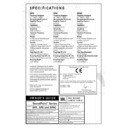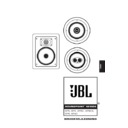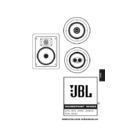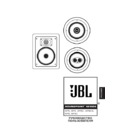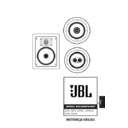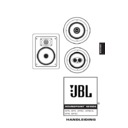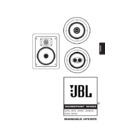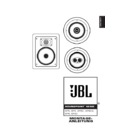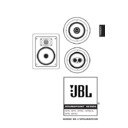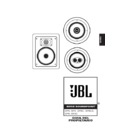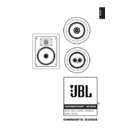JBL SP 6C (serv.man11) User Manual / Operation Manual ▷ View online
4
Phillips #2 screwdriver
Measuring tape
Utility knife
Pencil
Carpenter’s level
Awl
Tools Needed
The SoundPoint
™
Series in-wall
speakers were designed to be
easily installed. However, if
you are unsure of your ability
to properly install these loud-
speakers, please contact your
dealer or a qualified installer.
easily installed. However, if
you are unsure of your ability
to properly install these loud-
speakers, please contact your
dealer or a qualified installer.
I N S T A L L A T I O N
Speakers and electronics
terminals have corresponding
(+) and (–) terminals. Most
manufacturers of speakers and
electronics, including JBL, use
red to denote the (+) terminal
and black for the (–) terminal.
It is important to connect both
speakers identically: (+) on the
speaker to (+) on the amplifier
and (–) on the speaker to (–)
on the amplifier. Wiring “out
of phase” results in thin sound,
weak bass and a poor stereo
image. With the advent of multi-
channel surround-sound
systems, connecting all of
the speakers in your system
with the correct polarity
remains equally important in
order to preserve the proper
ambience and directionality
of the program material.
terminals have corresponding
(+) and (–) terminals. Most
manufacturers of speakers and
electronics, including JBL, use
red to denote the (+) terminal
and black for the (–) terminal.
It is important to connect both
speakers identically: (+) on the
speaker to (+) on the amplifier
and (–) on the speaker to (–)
on the amplifier. Wiring “out
of phase” results in thin sound,
weak bass and a poor stereo
image. With the advent of multi-
channel surround-sound
systems, connecting all of
the speakers in your system
with the correct polarity
remains equally important in
order to preserve the proper
ambience and directionality
of the program material.
Connection Tips
Wire Length
Recommended Size
Up to 20 ft.
16 gauge
Up to 30 ft.
12 gauge
Greater than 30 ft.
10 gauge
Front or Rear Speaker Outputs
LEFT RIGHT
LEFT
RIGHT
The wires for both speakers
should be the same length. If
one speaker is placed closer
to the amplifier than the other,
hide the excess wire behind
the wall.
should be the same length. If
one speaker is placed closer
to the amplifier than the other,
hide the excess wire behind
the wall.
S P E A K E R C O N N E C T I O N S
5
SP5, SP6
E X I S T I N G C O N S T R U C T I O N
Remove the grille from the
speaker frame.
speaker frame.
Determine the correct
speaker location.
speaker location.
Template
Level
NOTE: Always allow at least one-
half inch between a wall stud
and the speaker cutout or the
locking tabs will not be able to
swivel into place.
half inch between a wall stud
and the speaker cutout or the
locking tabs will not be able to
swivel into place.
≥
1/2"
≥
1/2"
≥
1/2"
Cut the dry wall.
Connect the speaker wires
to the speaker.
to the speaker.
Replace the metal grille.
Place the frame assembly
in the wall.
in the wall.
Screw down each of the four
Phillips head screws. The
locking tabs will swivel into
place and secure the unit to
the rear surface of the drywall.
Phillips head screws. The
locking tabs will swivel into
place and secure the unit to
the rear surface of the drywall.
6
SP6C
E X I S T I N G C O N S T R U C T I O N
Remove the grille from
the speaker frame.
the speaker frame.
≥
1/2"
≥
1/2"
≥
1/2"
Cut the drywall.
Connect the speaker wires
to the speaker.
to the speaker.
Place the frame assembly
in the wall.
in the wall.
Screw down each of the three
Phillips head screws. The locking
tabs will swivel into place and
secure the unit to the rear surface
of the drywall.
Phillips head screws. The locking
tabs will swivel into place and
secure the unit to the rear surface
of the drywall.
Replace the metal grille.
Determine the correct speaker
location.
location.
Note: Always allow at
least one-half inch between a
wall stud and the speaker cutout
or the locking tabs will not be
able to swivel into place.
wall stud and the speaker cutout
or the locking tabs will not be
able to swivel into place.
7
N E W C O N S T R U C T I O N
P A I N T I N G T H E S P E A K E R
F R A M E A N D G R I L L E
F R A M E A N D G R I L L E
T R O U B L E S H O O T I N G
SoundPoint™ Series loudspeak-
ers can be painted to match any
decor. If you wish to change
their color, the satin finish on the
grille and frame will function as
a primer coat. Before painting,
install the paint shield (in the
assembly kit) securely into the
recess in the baffle. This will
ers can be painted to match any
decor. If you wish to change
their color, the satin finish on the
grille and frame will function as
a primer coat. Before painting,
install the paint shield (in the
assembly kit) securely into the
recess in the baffle. This will
protect the speaker components
and baffle from paint residue.
Use a high-quality spray paint,
and apply a thin coat of color.
Be certain the grille perforations
remain free of paint. Filling them
with paint will diminish the
sound quality.
and baffle from paint residue.
Use a high-quality spray paint,
and apply a thin coat of color.
Be certain the grille perforations
remain free of paint. Filling them
with paint will diminish the
sound quality.
Note: Gently remove the acousti-
cal foam blanket from the grille
before painting. Reattach the
blanket after the paint has dried.
cal foam blanket from the grille
before painting. Reattach the
blanket after the paint has dried.
If there is no sound from any
of the speakers:
of the speakers:
• Check that receiver/amplifier
is on and a source is playing.
• Check all wires and connections
between receiver/amplifier and
speakers. Make sure all wires
are connected. Make sure none
of the speaker wires are frayed,
cut or punctured.
• Review proper operation of
your receiver/amplifier.
is on and a source is playing.
• Check all wires and connections
between receiver/amplifier and
speakers. Make sure all wires
are connected. Make sure none
of the speaker wires are frayed,
cut or punctured.
• Review proper operation of
your receiver/amplifier.
If there is no sound coming
from one speaker:
from one speaker:
• Check the “Balance” control
on your receiver/amplifier.
• Check all wires and connec-
tions between receiver/amplifier
and speakers. Make sure all
wires are connected. Make sure
on your receiver/amplifier.
• Check all wires and connec-
tions between receiver/amplifier
and speakers. Make sure all
wires are connected. Make sure
none of the speaker wires are
frayed, cut or punctured.
frayed, cut or punctured.
If there is low (or no) bass output:
• Make sure the connections
to the left and right “Speaker
Inputs” have the correct polarity
(+ and –).
• Consider adding a powered
subwoofer to your system.
• In Dolby* Digital or DTS
to the left and right “Speaker
Inputs” have the correct polarity
(+ and –).
• Consider adding a powered
subwoofer to your system.
• In Dolby* Digital or DTS
®
modes,
make sure your receiver/proces-
sor is correctly configured. When
using a subwoofer, make sure the
subwoofer output of the
receiver/processor has been
enabled. If no subwoofer is
being used, make sure the
left and right front and rear
speakers have been config-
ured as “LARGE.” See your
sor is correctly configured. When
using a subwoofer, make sure the
subwoofer output of the
receiver/processor has been
enabled. If no subwoofer is
being used, make sure the
left and right front and rear
speakers have been config-
ured as “LARGE.” See your
receiver/processor’s owner’s
manual for futher information on
correct speaker configuration in
Dolby Digital, DTS and other
surround-sound modes.
manual for futher information on
correct speaker configuration in
Dolby Digital, DTS and other
surround-sound modes.
If the system plays at low
volumes but shuts off as
volume is increased:
volumes but shuts off as
volume is increased:
• Check all wires and connec-
tions between receiver/amplifier
and speakers. Make sure all
wires are connected. Make sure
none of the speaker wires are
frayed, cut or punctured.
• If more than one pair of main
speakers is being used, check the
minimum-impedance require-
ments of your receiver/amplifier.
tions between receiver/amplifier
and speakers. Make sure all
wires are connected. Make sure
none of the speaker wires are
frayed, cut or punctured.
• If more than one pair of main
speakers is being used, check the
minimum-impedance require-
ments of your receiver/amplifier.
You will need to purchase the correct rough-in frame kit for your model:
Speaker Model
Rough-in Frame Kit
SP5
RIF5
SP6
RIF6
SP6C
RIF6C
Detailed installation instructions are supplied with the rough-in kit.
Display

